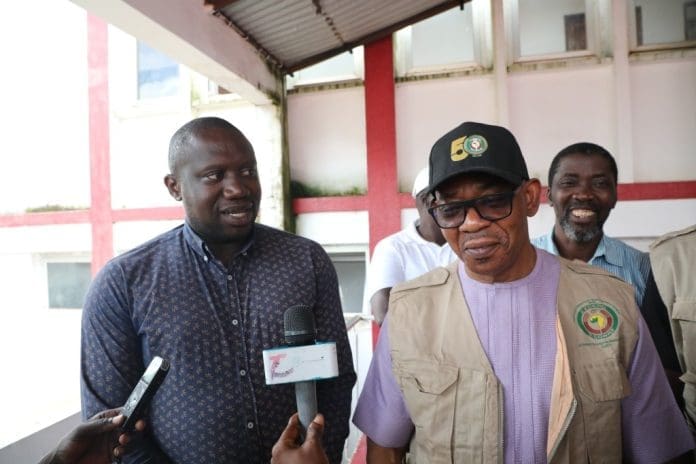ECOWAS launched a six-day monitoring and evaluation mission in Guinea-Bissau on Sunday to assess the impact of humanitarian interventions following devastating floods that displaced thousands in 2022.
The mission, led by the Department of Humanitarian Affairs and Social Development, will evaluate the implementation and effectiveness of disaster risk reduction frameworks established in partnership with local agencies. The assessment runs through September 6, focusing on nine communities severely affected by the 2022 flooding disaster.
Approximately 11,000 households across Cuntum in Bissau, Quinhamel, Quissete in Biombo, and Nan Balanta in Tite experienced displacement, crop destruction, and heightened vulnerability to coastal erosion and food insecurity. Women, children, and persons with disabilities comprised significant portions of the affected populations.
ECOWAS previously financed humanitarian assistance worth $670,000 to support approximately 25,000 flood victims, enabling comprehensive interventions across multiple sectors. The current mission aims to evaluate the long-term impact of these investments on community resilience and disaster preparedness.
Key interventions under assessment include school rehabilitation to restore educational access, construction and rehabilitation of 9,390 linear metres of protective dikes and drainage channels, and installation of water regulation systems for improved irrigation management. Agricultural restoration efforts prepared 550 hectares of rice fields to rebuild farming livelihoods disrupted by the floods.
The humanitarian response also encompassed distribution of food items including rice and cooking oil, alongside non-food assistance such as zinc sheets, mattresses, and treated mosquito nets to vulnerable groups including widows and displaced households.
Mr. Godfrey Ameachi Alozie, representing Director Sintiki Tarfa-Ugbe, emphasized ECOWAS commitment to improving living standards and strengthening resilience to natural disasters across member states. The organization continues supporting national disaster management agencies in building capacity and enhancing early warning mechanisms.
The evaluation team conducted field visits to Antula and Quissete communities alongside staff from the Civil Protection Agency of Guinea-Bissau and the Red Cross. These inspections included direct engagement with beneficiaries to assess the practical impact of ECOWAS-supported interventions on affected communities.
Climate vulnerability remains a critical concern for Guinea-Bissau, where rising sea levels continue devastating coastal villages, destroying homes, farmland and livelihoods. The country faces ongoing challenges from extreme weather events that are becoming increasingly frequent due to climate change.
The mission represents part of ECOWAS’s broader commitment to building regional resilience against climate shocks and protecting vulnerable populations from extreme weather impacts. The organization recognizes the interconnected nature of climate adaptation, disaster risk reduction, and sustainable development across West Africa.
Partnership coordination involves multiple stakeholders including the Civil Protection Agency, Red Cross, and national fire service of Guinea-Bissau. This collaborative approach reflects ECOWAS strategy of working through national institutions to strengthen local capacity and ownership of disaster risk reduction initiatives.
The assessment will identify opportunities to strengthen resilience and climate adaptation strategies not only in Guinea-Bissau but across the broader ECOWAS region. Lessons learned from the Guinea-Bissau experience may inform similar interventions in other member states facing comparable climate vulnerabilities.
Guinea-Bissau’s geographic position and low-lying coastal areas make it particularly susceptible to flooding and sea-level rise. The 2022 floods highlighted systemic vulnerabilities in infrastructure, agriculture, and community preparedness that required comprehensive regional support.
The monitoring mission ensures accountability in humanitarian assistance delivery while gathering data for future disaster response planning. Results will inform ECOWAS decision-making on resource allocation and policy frameworks for climate adaptation across the West African region.
Source: newsghana.com.gh











